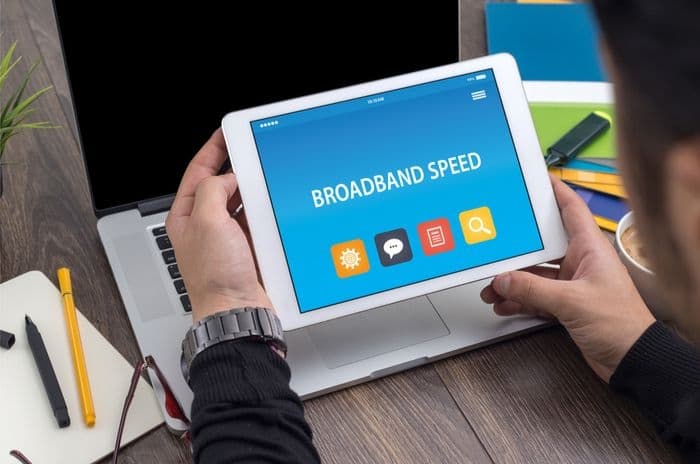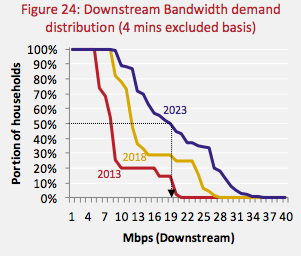Home > Broadband > News > BSG: you don't need ultrafast broadband
BSG: you don't need ultrafast broadband
EVEN in ten years time, most households won't need really fast broadband, a report out this week suggests.

By 2023, the Broadband Stakeholder Group (BSG) researchers predicted, the average UK household will only actually need 19Mb broadband speeds and even the very heaviest users will only need 35Mb.
The report cautioned against interpreting the results as "a magic number for desired bandwidth speeds one decade out".
But, it said, the UK needs to develop a better evidence base for how far planned infrastructure will actually suit the needs of consumers.
Do you need that speed?
The BSG report isn't the first to question the UK's need for speed.
Take-up of fibre services where they're available is still very low, suggesting, many say, that households don't really want faster internet.
Ofcom's latest communications report found that take up had increased by 100% in the past year, likely driven by the many providers offering BT FTTC connections for the same price as, or not much more than, ADSL. But that's still only 22%.
Moreover, some have argued that devoting resources to improving infrastructure risks deepening digital divides or even creating a 'digital underclass'.
"Affordability of broadband services has replaced access to infrastructure as the biggest contributor to the digital divide today," a recent Huawei report on European broadband concluded.
Similarly, a 2010 Vodafone and Ingenious Consulting study found that rolling out standard broadband throughout the country would have far greater benefits than boosting infrastructure in urban areas to superfast speeds.
Why the disagreement?
Nevertheless many continue to press for ultrafast speeds across the UK, arguing that without them consumers will be unable to access cutting edge technology.
How have they and the BSG managed to reach such different conclusions?
Three reasons, says the BSG report available in full here [pdf]: multitasking; falling bit rate and unfairly focusing on peak demand.
Other estimates of broadband usage have focused on multitasking households to what, the BSG says, is sometimes an absurd degree.
It's easy to see why we would want to think about multitasking to some extent: households have more internet-enabled devices than ever and it seems reasonable to assume that we'll want to, say, Skype while watching high definition video.
But, says the BSG, it's worth considering that 64% of UK households comprise just one or two people: in the majority of households there's only so much multitasking that can go on.
According to BSG calculations, two people watching two HDTV streams and making two video calls while looking at webpages still only need 15Mb speeds in 2023.
To justify the need for 100Mb speeds, Australia's National Broadband Network needed to hypothesise eight people using a connection at the same time, many of them using intensive applications like gaming and VoIP.
Other studies have also failed to account for falling bit rate, the BSG argues.
Improvements in compression techniques mean that bit rate for high quality video has been falling for some time and will continue to do so.
As compression techniques improve, video becomes less bit rate intensive and, therefore, less of a concern in traffic terms, even as the amount of video traffic increases.

The BSG projections, peak 4 minutes excluded. Source: BSG.
Finally, the BSG figures are based on excluding the peak of demand: the 4 busiest minutes in a month.
These are excluded on the basis that internet providers should take a 99.999% good service approach, which is a widely accepted standard.
However, add in those four extra minutes and speed needs go up significantly.
So, for example, with four minutes a month excluded, a 4 adult, high usage household needs 38Mb; without that exclusion they need just over 50Mb.
Those advocating higher speeds might take issue with any of these assumptions.
In particular, this report relies on crystal ball gazing future usage. For many, future proofing broadband means proofing it against changes in technology use as yet unforeseen.
Changing our plans
A little hysterically, given the many warnings BSG gave against interpreting its findings as a baseline, KC, the Hull incumbent provider, has criticised the report for setting the UK on an "unambitious" infrastructure path.
"There is a danger that if the government uses it as its yard stick the UK will fall further behind other developed economies for infrastructure," a KC director told ThinkBroadband earlier this week.
"...If the UK is to remain an economic power on the global stage we need the infrastructure in place to deliver this," he added.
However, there seems little danger of infrastructure plans changing at this point and, actually, even based on this report they're not exactly far overreaching consumer needs.
The current Government target is 25Mb plus broadband available to 95% of households by 2017. With the new Ofcom-mandated coverage rules, 4G and other wireless are likely to fill most of the remaining 5%.
The EU also has a target: 30Mb plus to 100% of homes by 2020.
Receive consumer updates that matter in our newsletter

We are independent of all of the products and services we compare.

We order our comparison tables by price or feature and never by referral revenue.

We donate at least 5% of our profits to charity, and we aim to be climate positive.
Latest News

13 February 2026
Sky TV bundles Netflix, Disney+, HBO Max and hayu
13 February 2026
Telecoms Consumer Charter promises no surprise bill hikes
8 February 2026
TV licence to rise to £180 from April 2026Receive consumer updates that matter in our newsletter


